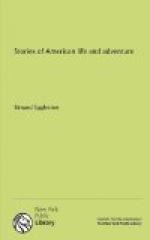If you had gone into this school some day, you might have seen a boy sitting on a punishment bench all alone. This was a fellow who had told a lie or used bad language. He was put there as not fit to sit near anybody else. If he committed the offense often, a yoke would be put round his neck, as if he were a brute. Sometimes, however, the teacher would give the scholars their choice of a blow on the hand or a seat on the punishment bench. They usually preferred the blow.
At certain times the scholars were permitted to study aloud, but at other times they were obliged to keep still. And a boy or girl was put as a watcher, to set down the names of those who talked in this time of quiet.
The old schoolmaster in Skippack wrote one hundred rules of good behavior for his scholars. This is perhaps the first book on good manners written in America. But rules of behavior for people living in houses of one or two rooms, as they did in that day, were very different from those needed in our time. Here are some of the rules:
“When you comb your hair, do not go out in the middle of the room,” says the schoolmaster. This was because families were accustomed to eat and sleep in the same room.
“Do not eat your morning bread on the road or in school,” he tells them, “but ask your parents to give it to you at home.” From this we see that the common breakfast was bread alone, and that the children often ate it as they walked to school.
The table manners of that day were very good for the time, but they seem very curious to us. He says, “Do not wabble with your stool,” because rough home-made stools were the common chairs then, and the floors, made of boards that were split and not sawed, were so uneven that a noisy child could easily rock his stool to and fro.
“Put your knife upon the right and your bread on the left side,” he says. Forks were little used in those days, and the people in the country did not have any. He also tells them not to throw bones under the table. It was a common practice among some people of that time to throw bones and scraps under the table, where the dogs ate them.
The child is not told to wait for others when he has finished eating, or to ask to be excused. “Get up quietly,” says the schoolmaster, “and take your stool with you. Wish a pleasant mealtime, and go to one side.” The child is told not to put the remaining bread into his pocket.
As time passed on, Christopher Dock had many friends, for all his scholars of former years loved him greatly. He lived to be very old, and taught his schools to the last. One evening he did not come home, and the people went to look for the beloved old man. They found their dear old master on his knees in the schoolhouse. He had died while praying alone.




